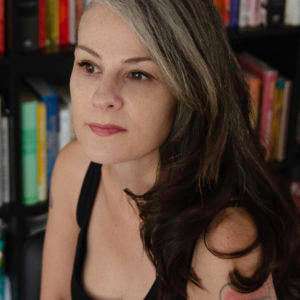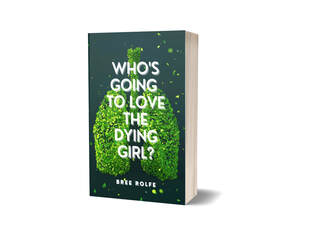Unsolicited Press
 If you could cook dinner for any author, dead or alive, who would it be? What would you make? It would definitely be Anne Sexton. I would probably have to order take out, but also, I am I wouldn’t be too concerned with the food. I would, for sure, learn how to make a killer martini and I would keep them flowing. What scares you the most about the writing process? How do you combat your fears? I don’t think it’s too original, but what scares me is that one day I will just stop writing. I think the best way to stave off this fear is simply to put your ass in the chair and write even when you don’t want to. I am in a lot writing groups and do a lot of generative workshops to make sure I am always giving myself structure and space to write. Who is your biggest literary crush, author or character? This is kind of an awkward question, but for sure, Terrance Hayes. What books are on your nightstand? Currently Gina Frangello’s memoir Blow Your House Down, Dave Berman’s poetry collection Actual Air, and some books I just bought at Third Man Records in Nashville Pain the Board Game by Sampson Starkweather, Nine Bar Blues by Sheree Renée Thomas, and The Gallows Pole by Benjamin Myers. Favorite punctuation mark? Why? This is kind of a cliché answer for a poet, but the em dash. Its rules are murky and versatile and I am not a fan of rules. What book were you supposed to read in high school, but never did? Probably everything I was assigned, which in retrospect is kind of a shame. As an English teacher, I feel woefully under-read and I had to read a bunch of books I should’ve read before teaching them. I am playing catch up now. I for sure never read all of the Scarlet Letter when I was supposed to. I just couldn’t get through it. What inanimate object would you thank in your acknowledgements? Trikafta, which is the drug that saved my life. Most of the poems in this collection were written when people with Cystic Fibrosis generally died in their 30s or 40s. With this new drug, the prognosis is much more hopeful. Unfortunately, this means I now have to start saving for retirement, but I guess that’s a good thing. If you could write an inspirational quote on the mirrors of aspiring writers, what would you write? Say what you mean and stop bullshitting. Does writing energize or exhaust you? Usually it energizes me. It’s only exhausting when I can’t do it. Once the writing starts, it’s exciting. What are common traps for aspiring writers? I think sometimes people are too hung up on trying to be really deep or “poetic” when they first start writing poetry. They can’t just get out of their own way and just say what they want to say. I think it’s best just to trust your words when they arrive simply and straightforwardly. What is your writing Kryptonite? A lack of time or focus on the wrong priorities. Have you ever gotten reader’s block? Yes. Many, many times. Do you think someone could be a writer if they don’t feel emotions strongly? I mean, I think they could be a “writer,” but I am not sure they could be a really great writer. What other authors are you friends with, and how do they help you become a better writer? My poetry queens and dear friends, Jessica Piazza and Jill Alexander Essbaum, have not only helped me by being stellar role models but also constantly providing me with much needed validation and guidance. Reading their work and following their journeys has given me a guide for what is possible. I am truly a better writer for having their friendship. Also, Tod Goldberg and Wendy Duren, who I met at the Bennington Writing Seminars, have been a constant source of joy and love and support for me. They are always willing to listen to me and give me advice on my work. Tod has been more than gracious in lending me his brilliance whenever I have needed it. I am also in an accountability group with a group of friends from Bennington College and we meet on zoom a few times a month. This group just helps keep me grounded and connected to the writing. It is a group of really talented and kind people who offer me a wealth of support and resources. I am very grateful to have it. Finally, for over ten years, I have been in a writing group called Brass Tacks with an insanely talented group of poets, including my dear friends Tina Posner and Judy Jensen. If I hadn’t been invited to that group by poet David Meischen, I truly believe I wouldn’t have ever published this book. Do you want each book to stand on its own, or are you trying to build a body of work with connections between each book? I don’t think I ever consciously thought about this when putting the collection together. However, I have finished a full length collection and I do think it’s connected to this first one. After that, I am not sure, but for now there are connections. How did publishing your first book change your process of writing? I don’t think it changed my process of writing too much except that it sort of gave shape and validation to what I was doing. I now think of the poems more of a collective whole or in terms of connections rather than just single poems floating in isolation. When I write now, there is a sort of universe in which my work lives. I think more about how my voice fits into the world. I am not sure I always thought of that before the book was accepted. What was the best money you ever spent as a writer? I waffle on this issue a lot, but since you can’t put a price tag on connections and friendship, I am going to say spending the money on getting my MFA at the Bennington Writing Seminars. I think MFA programs are a lot of money and not always “worth” it in terms of job prospects or things of a practical nature, but for me, I don’t regret spending the money because it gave me a writing life. What authors did you dislike at first but grew into? I tend to just move on quickly if I don’t like someone’s work. There’s so much out there that I can connect with that I don’t re-visit writers who I don’t connect with very often. But maybe James Joyce. I didn’t appreciate him much until I read Dubliners. What was an early experience where you learned that language had power? I started writing when I was in fourth grade. I stole a stack of paper from my classroom and I was going to write a novel that was basically a rip off of a novel I had just read. And I guess in that moment, I realized I was so moved by a story that I wanted to write my own. Though, I quickly realized that novels were most likely not in my future and by middle school I switched to poetry. What’s your favorite under-appreciated novel? Mysterious Skin by Scott Heim. Or really any of Scott Heim’s books. He writes the most heartbreakingly beautiful work. I really want a copy of his poetry collection, but it’s impossible to find. I wish more people would read his work. He deserves all the money and awards. As a writer, what would you choose as your mascot/avatar/spirit animal? I have a lamp I love with a frog that looks kind of apathetic. So, I am going to go with an apathetic frog. What do you owe the real people upon whom you base your characters? Well, my poems are about me and the people who appear in them are real people, though always fictionalized in some way. Poetic license and all. And some of them, I don’t owe anything and some of them I owe everything to. How many unpublished and half-finished books do you have? I have one unpublished right now and maybe one half finished. I have a legion of abandoned ideas for collections though. What does literary success look like to you? Creating work that I am proud of mostly. If it also gets out into the world, then that is a nice bonus. What’s the best way to market your books? With poetry, I think it’s mostly word of mouth and doing events/ readings. I guess love it or hate it, social media is helpful. What’s the most difficult thing about writing characters from the opposite sex? I don’t really write characters, but I do worry that some of the situations and people that appear in my poems will make the real people annoyed or angry. However, the beauty of poetry is that it allows for a sort of conceptual version of the truth and not a journalistic approach. This usually alleviates the issue. But I guess the hardest part, particularly in this book, was deciding on telling my truth and not caring if people were offended. What did you edit out of this book?” I cut out a lot of poems I liked a lot but weren’t serving the narrative arch of the book. I am not always good at that so many thanks to my friend and fellow poet Tina Posner who really helped me find the story I wanted to tell. If you didn’t write, what would you do for work? Well, I mostly teach for work, so I guess I would just teach. I can’t really imagine a career I could do well that didn’t involve some kind of writing. Maybe I’d try and be a private investigator-- that type of work always seemed interesting to me.  Who’s Going to Love the Dying Girl tells the story of a woman diagnosed with Cystic Fibrosis who is trying to navigate life and love in a body that is failing. These poems capture the collision of a reckless past and a foreshortened future with unwavering honesty. They confront the title question thrown at her one terrible night. Comments are closed.
|
Popular Topics
All
We Support Indie Bookshops |
